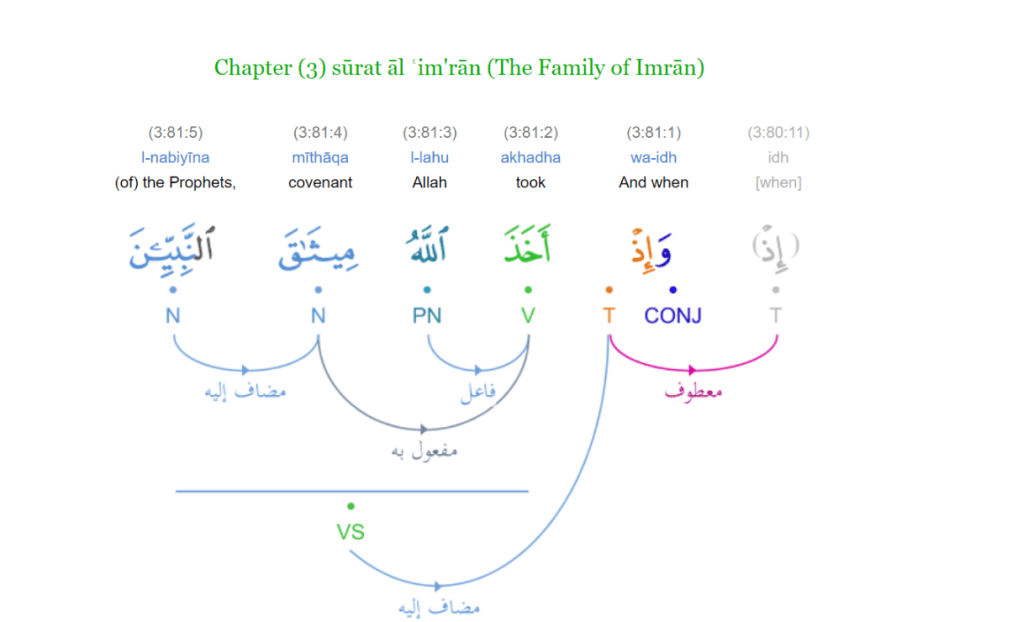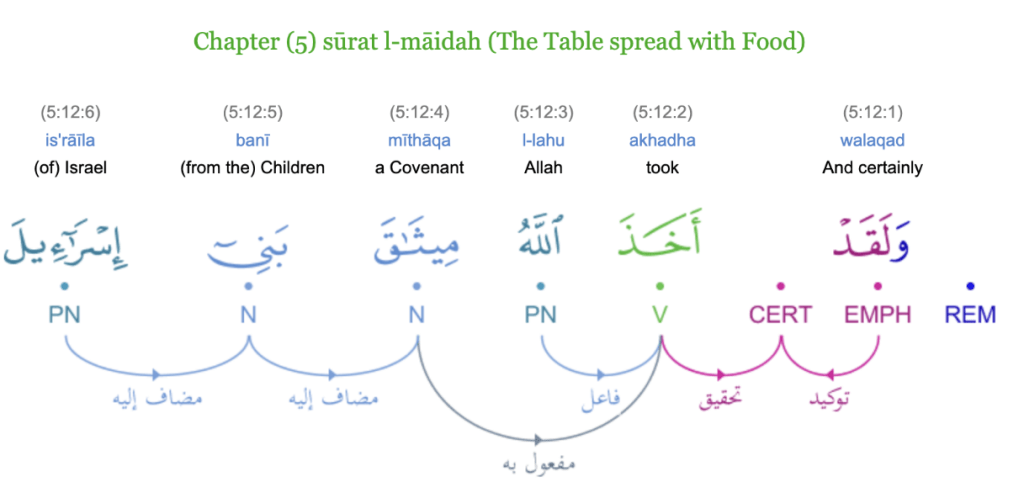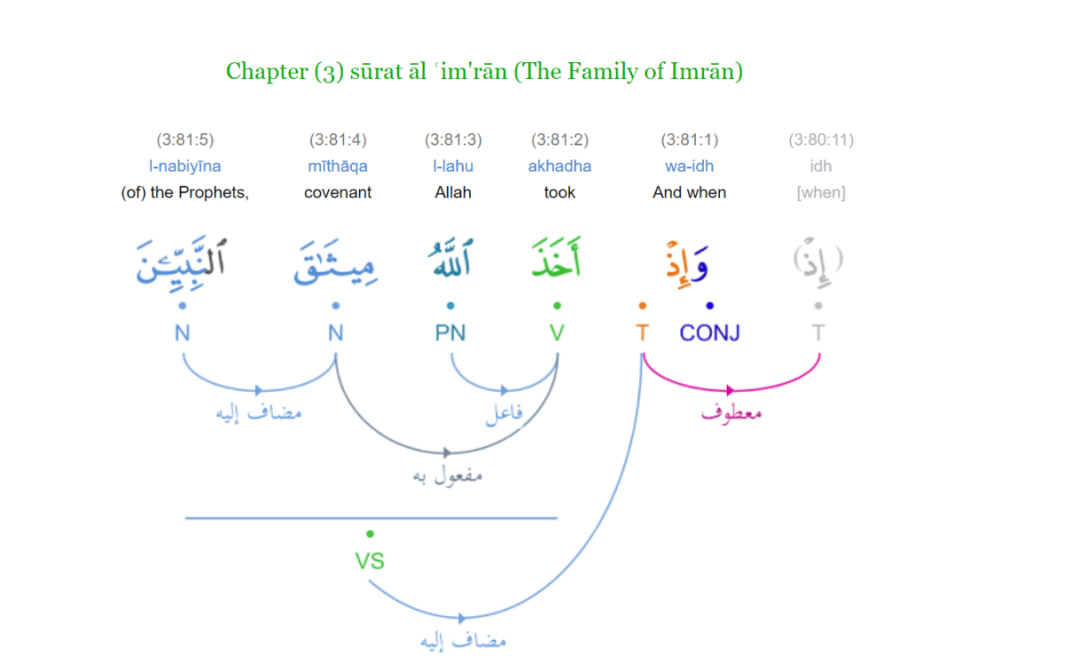Sura 3, The Amramites (Ãli-‘Imrãn / آل عمران), verse 81 states the following:
[3:81] Recall GOD took a covenant from the prophets, saying, “I will give you the scripture and wisdom. Afterwards, a messenger will come to confirm all existing scriptures. You shall believe in him and support him.” He said, “Do you agree with this, and pledge to fulfill this covenant?” They said, “We agree.” He said, “You have thus borne witness, and I bear witness along with you.”
وَإِذْ أَخَذَ ٱللَّهُ مِيثَـٰقَ ٱلنَّبِيِّـۧنَ لَمَآ ءَاتَيْتُكُم مِّن كِتَـٰبٍ وَحِكْمَةٍ ثُمَّ جَآءَكُمْ رَسُولٌ مُّصَدِّقٌ لِّمَا مَعَكُمْ لَتُؤْمِنُنَّ بِهِۦ وَلَتَنصُرُنَّهُۥ قَالَ ءَأَقْرَرْتُمْ وَأَخَذْتُمْ عَلَىٰ ذَٰلِكُمْ إِصْرِى قَالُوٓا۟ أَقْرَرْنَا قَالَ فَٱشْهَدُوا۟ وَأَنَا۠ مَعَكُم مِّنَ ٱلشَّـٰهِدِينَ
| 1 | wa-idh | وَإِذْ | And when / recall |
| 2 | akhadha | أَخَذَ | [He] took |
| 3 | l-lahu | ٱللَّهُ | God |
| 4 | mīthāqa | مِيثَـٰقَ | a covenant (from) |
| 5 | l-nabiyīna | ٱلنَّبِيِّـۧنَ | the prophets, |

Despite its clear reading, some claim this is not a covenant from the prophets but a covenant of the prophets and that the people taking the covenant are not the prophets but the people of the scripture.
Grammatical Reasoning
One of the main arguments for this is that the word “from”( مِن ) is not in the Arabic. Yet we see the exact same grammatical statement used in the Quran three other times without the use of “from”( مِن ), and every time it is a covenant from the subject mentioned and not a covenant of the subject mentioned where the covenant is with some other group not mentioned.
[3:187] Recall GOD took a covenant from those who received the scripture: “You shall proclaim it to the people, and never conceal it.” But they disregarded it behind their backs, and traded it away for a cheap price. What a miserable trade.
وَإِذْ أَخَذَ ٱللَّهُ مِيثَـٰقَ ٱلَّذِينَ أُوتُوا۟ ٱلْكِتَـٰبَ لَتُبَيِّنُنَّهُۥ لِلنَّاسِ وَلَا تَكْتُمُونَهُۥ فَنَبَذُوهُ وَرَآءَ ظُهُورِهِمْ وَٱشْتَرَوْا۟ بِهِۦ ثَمَنًا قَلِيلًا فَبِئْسَ مَا يَشْتَرُونَ
| 1 | wa-idh | وَإِذْ | And when |
| 2 | akhadha | أَخَذَ | [He] took |
| 3 | l-lahu | ٱللَّهُ | God |
| 4 | mīthāqa | مِيثَـٰقَ | a covenant (from) |
| 5 | alladhīna | ٱلَّذِينَ | those who |
| 6 | ūtū | أُوتُوا۟ | [they] were given |
| 7 | l-kitāba | ٱلْكِتَـٰبَ | the scripture, |

Additionally, there are an additional two verses that are almost identical as well.
[2:83] Recall we made a covenant with the Children of Israel: “You shall not worship except GOD. You shall honor your parents and regard the relatives, the orphans, and the poor. You shall treat the people amicably. You shall observe the Contact Prayers (Salat) and give the obligatory charity (Zakat).” But you turned away, except a few of you, and you became averse.
وَإِذْ أَخَذْنَا مِيثَـٰقَ بَنِىٓ إِسْرَٰٓءِيلَ لَا تَعْبُدُونَ إِلَّا ٱللَّهَ وَبِٱلْوَٰلِدَيْنِ إِحْسَانًا وَذِى ٱلْقُرْبَىٰ وَٱلْيَتَـٰمَىٰ وَٱلْمَسَـٰكِينِ وَقُولُوا۟ لِلنَّاسِ حُسْنًا وَأَقِيمُوا۟ ٱلصَّلَوٰةَ وَءَاتُوا۟ ٱلزَّكَوٰةَ ثُمَّ تَوَلَّيْتُمْ إِلَّا قَلِيلًا مِّنكُمْ وَأَنتُم مُّعْرِضُونَ
| 1 | wa-idh | وَإِذْ | And when / Recall |
| 2 | akhadhnā | أَخَذْنَا | we took |
| 3 | mīthāqa | مِيثَـٰقَ | (the) covenant |
| 4 | banī | بَنِىٓ | (from the) Children (of) |
| 5 | is’rāīla | إِسْرَٰٓءِيلَ | Israel, |

[5:12] GOD had taken a covenant from the Children of Israel, and we raised among them twelve patriarchs. And GOD said, “I am with you, so long as you observe the Contact Prayers (Salat), give the obligatory charity (Zakat), and believe in My messengers and respect them, and continue to lend GOD a loan of righteousness. I will then remit your sins, and admit you into gardens with flowing streams. Anyone who disbelieves after this, has indeed strayed off the right path.”
وَلَقَدْ أَخَذَ ٱللَّهُ مِيثَـٰقَ بَنِىٓ إِسْرَٰٓءِيلَ وَبَعَثْنَا مِنْهُمُ ٱثْنَىْ عَشَرَ نَقِيبًا وَقَالَ ٱللَّهُ إِنِّى مَعَكُمْ لَئِنْ أَقَمْتُمُ ٱلصَّلَوٰةَ وَءَاتَيْتُمُ ٱلزَّكَوٰةَ وَءَامَنتُم بِرُسُلِى وَعَزَّرْتُمُوهُمْ وَأَقْرَضْتُمُ ٱللَّهَ قَرْضًا حَسَنًا لَّأُكَفِّرَنَّ عَنكُمْ سَيِّـَٔاتِكُمْ وَلَأُدْخِلَنَّكُمْ جَنَّـٰتٍ تَجْرِى مِن تَحْتِهَا ٱلْأَنْهَـٰرُ فَمَن كَفَرَ بَعْدَ ذَٰلِكَ مِنكُمْ فَقَدْ ضَلَّ سَوَآءَ ٱلسَّبِيلِ
| 1 | walaqad | وَلَقَدْ | And for sure |
| 2 | akhadha | أَخَذَ | [He] took |
| 3 | l-lahu | ٱللَّهُ | God |
| 4 | mīthāqa | مِيثَـٰقَ | a covenant (from) |
| 5 | banī | بَنِىٓ | (the) Children |
| 6 | is’rāīla | إِسْرَٰٓءِيلَ | (of) Israel |

The following verse is the only statement that is even remotely similar that refers to a covenant with another group than the subject of the covenant. Yet notice that this verse is grammatically different and explicitly mentions that the covenant was with the group specified through the use of the word “upon them” (ʿalayhim / عَلَيْهِم ), which does not occur in the above four examples.
[7:169] Subsequent to them, He substituted new generations who inherited the scripture. But they opted for the worldly life instead, saying, “We will be forgiven.” But then they continued to opt for the materials of this world. Did they not make a covenant to uphold the scripture, and not to say about GOD except the truth? Did they not study the scripture? Certainly, the abode of the Hereafter is far better for those who maintain righteousness. Do you not understand?
فَخَلَفَ مِنۢ بَعْدِهِمْ خَلْفٌ وَرِثُوا۟ ٱلْكِتَـٰبَ يَأْخُذُونَ عَرَضَ هَـٰذَا ٱلْأَدْنَىٰ وَيَقُولُونَ سَيُغْفَرُ لَنَا وَإِن يَأْتِهِمْ عَرَضٌ مِّثْلُهُۥ يَأْخُذُوهُ أَلَمْ يُؤْخَذْ عَلَيْهِم مِّيثَـٰقُ ٱلْكِتَـٰبِ أَن لَّا يَقُولُوا۟ عَلَى ٱللَّهِ إِلَّا ٱلْحَقَّ وَدَرَسُوا۟ مَا فِيهِ وَٱلدَّارُ ٱلْـَٔاخِرَةُ خَيْرٌ لِّلَّذِينَ يَتَّقُونَ أَفَلَا تَعْقِلُونَ
| 19 | alam | أَلَمْ | Was not |
| 20 | yu’khadh | يُؤْخَذْ | it taken |
| 21 | ʿalayhim | عَلَيْهِم | upon them |
| 22 | mīthāqu | مِّيثَـٰقُ | a covenant (of) |
| 23 | l-kitābi | ٱلْكِتَـٰبِ | the scripture |

This also shows that if the covenant mentioned in 3:81 was not a covenant from the prophets but actually a covenant with the people of the scripture, we would expect the word “upon them” (ʿalayhim / عَلَيْهِم ) would also be used in this verse to show that the covenant is with another group and not the prophets just like it is done in 7:169.
Contextual Reasoning
The second argument is that some people argue that contextually this verse is about the people of the scripture and not the prophets, so, therefore, it is a covenant from the people of the scripture and not the prophets. The reasoning for this is that the people of the scripture are referenced ten verses before.
[3:70] O followers of the scripture, why do you reject these revelations of GOD though you bear witness (that this is the truth)?
يَـٰٓأَهْلَ ٱلْكِتَـٰبِ لِمَ تَكْفُرُونَ بِـَٔايَـٰتِ ٱللَّهِ وَأَنتُمْ تَشْهَدُونَ
[3:71] O followers of the scripture, why do you confound the truth with falsehood, and conceal the truth, knowingly?
يَـٰٓأَهْلَ ٱلْكِتَـٰبِ لِمَ تَلْبِسُونَ ٱلْحَقَّ بِٱلْبَـٰطِلِ وَتَكْتُمُونَ ٱلْحَقَّ وَأَنتُمْ تَعْلَمُونَ
The problem with this argument is that these verses are calling out the People of the Book’s twisting of the scripture. As prophets are the ones who bring scripture, they are attributing lies to them. Yet the immediate previous two verses, before 3:81, shifts from addressing the people of the scripture to being about the prophets themselves.
[3:79] Never would a human being whom GOD blessed with the scripture and prophethood say to the people, “Idolize me beside GOD.” Instead, (he would say), “Devote yourselves absolutely to your Lord alone,” according to the scripture you preach and the teachings you learn.
مَا كَانَ لِبَشَرٍ أَن يُؤْتِيَهُ ٱللَّهُ ٱلْكِتَـٰبَ وَٱلْحُكْمَ وَٱلنُّبُوَّةَ ثُمَّ يَقُولَ لِلنَّاسِ كُونُوا۟ عِبَادًا لِّى مِن دُونِ ٱللَّهِ وَلَـٰكِن كُونُوا۟ رَبَّـٰنِيِّـۧنَ بِمَا كُنتُمْ تُعَلِّمُونَ ٱلْكِتَـٰبَ وَبِمَا كُنتُمْ تَدْرُسُونَ
[3:80] Nor would he command you to idolize the angels and the prophets as lords. Would he exhort you to disbelieve after becoming submitters?
وَلَا يَأْمُرَكُمْ أَن تَتَّخِذُوا۟ ٱلْمَلَـٰٓئِكَةَ وَٱلنَّبِيِّـۧنَ أَرْبَابًا أَيَأْمُرُكُم بِٱلْكُفْرِ بَعْدَ إِذْ أَنتُم مُّسْلِمُونَ
Also, it is worth noting that verse 3:81 begins with the expression “wa-idh” ( وَإِذْ ). The translation of this word would be “and when [in the past]” or, more suitably, “recall.” When a verse begins with this word, it is often used to shift focus to a kind of flashback or annotation of the subject at hand. So it is only appropriate that when the previous two verses discuss the character of their prophets that the callback would be regarding a covenant from the prophets. This would be the appropriate reference when juxtaposed with the previous two verses.
[3:81] Recall GOD took a covenant from the prophets, saying, “I will give you the scripture and wisdom. Afterwards, a messenger will come to confirm all existing scriptures. You shall believe in him and support him.” He said, “Do you agree with this, and pledge to fulfill this covenant?” They said, “We agree.” He said, “You have thus borne witness, and I bear witness along with you.”
وَإِذْ أَخَذَ ٱللَّهُ مِيثَـٰقَ ٱلنَّبِيِّـۧنَ لَمَآ ءَاتَيْتُكُم مِّن كِتَـٰبٍ وَحِكْمَةٍ ثُمَّ جَآءَكُمْ رَسُولٌ مُّصَدِّقٌ لِّمَا مَعَكُمْ لَتُؤْمِنُنَّ بِهِۦ وَلَتَنصُرُنَّهُۥ قَالَ ءَأَقْرَرْتُمْ وَأَخَذْتُمْ عَلَىٰ ذَٰلِكُمْ إِصْرِى قَالُوٓا۟ أَقْرَرْنَا قَالَ فَٱشْهَدُوا۟ وَأَنَا۠ مَعَكُم مِّنَ ٱلشَّـٰهِدِينَ
33:7
One last clue as to why this is a covenant from the prophets and not a covenant of the prophets is that this covenant is referenced elsewhere in the Quran in the following verse:
[33:7] Recall that we took from the prophets their covenant, including you (O Muhammad), Noah, Abraham, Moses, and Jesus the son of Mary. We took from them a solemn pledge.
وَإِذْ أَخَذْنَا مِنَ ٱلنَّبِيِّـۧنَ مِيثَـٰقَهُمْ وَمِنكَ وَمِن نُّوحٍ وَإِبْرَٰهِيمَ وَمُوسَىٰ وَعِيسَى ٱبْنِ مَرْيَمَ وَأَخَذْنَا مِنْهُم مِّيثَـٰقًا غَلِيظًا
| 1 | wa-idh | وَإِذْ | And when / Recall |
| 2 | akhadhnā | أَخَذْنَا | we took |
| 3 | mina | مِنَ | from |
| 4 | l-nabiyīna | ٱلنَّبِيِّـۧنَ | the prophets |
| 5 | mīthāqahum | مِيثَـٰقَهُمْ | their covenant |
It is worth noting not only does this verse specifically reference the covenant from the prophets, but it also uses the word “from” ( mina / مِنَ ). All these points solidify that the covenant made in 3:81 was not a covenant with the people of the scripture, but a covenant with the prophets, as clearly stated in the verse.


It is clear that Allah took the covenant from the Prophets and Messengers! It is abundantly clear that a Messenger will be sent after Prophet Muhammad, Allah says every community will receive a Messenger. This Messenger who will certainly appear after Muhammad, will have the help and support of the Messengers who took the Covenant, including Prophet Muhammad! May the Imamaa come quickly to restore the Din of Abraham the Hanifan, and to make clear what the Prophets and Messengers believed in and followed by Allah’s leave, grace and mercy!
Salaamun Alaykum Ikhwan!
LikeLike